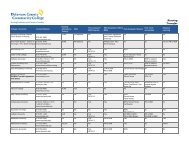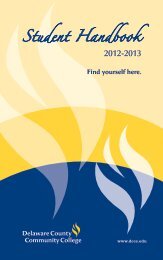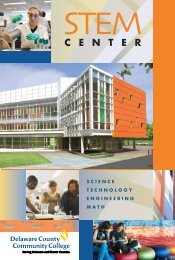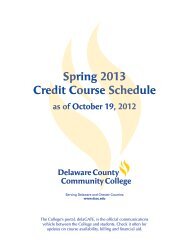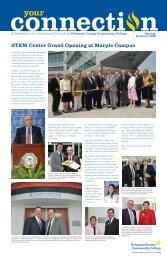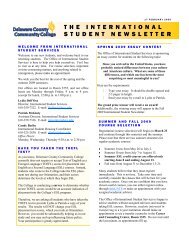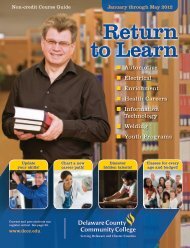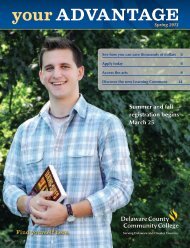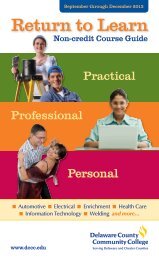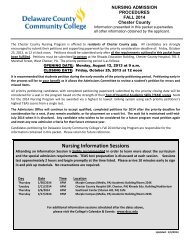2010 Catalog - Delaware County Community College
2010 Catalog - Delaware County Community College
2010 Catalog - Delaware County Community College
You also want an ePaper? Increase the reach of your titles
YUMPU automatically turns print PDFs into web optimized ePapers that Google loves.
160 COURSE DESCRIPTIONS<br />
able to "make it" and others continue to be disproportionately<br />
disadvantaged; and (3) race continues to be a<br />
central organizing principle in American society.<br />
Furthermore, we will examine the "other" from the<br />
viewpoint of those marginalized in society. Therefore, we<br />
will explore the relationship between the dominant -<br />
hegemonic -culture, and subcultural beliefs, attitudes,<br />
challenges, and attempts to redefine group status. This<br />
means we will focus upon power relationships and the<br />
dynamics of group attempts to access power, and how<br />
these movements have shaped and transformed the<br />
American social fabric.<br />
Upon successful completion of the course, students<br />
should be able to:<br />
• Describe the social construction of racial and<br />
ethnic categories.<br />
• Demonstrate critical thinking on issues of race<br />
and ethnicity.<br />
• Demonstrate critical thinking on racial inequality.<br />
• List the racial contradictions inherent in U.S. society,<br />
and different strategies toward resolving them.<br />
• Describe various immigrant experiences in the U.S.<br />
• Describe and discuss theories of integration.<br />
• Evaluate the positive and negative dimensions of your<br />
own cultural experience. Discuss and write about<br />
structural forces, which shape social activity.<br />
• Present ideas clearly, briefly and in an engaging<br />
manner in a public setting.<br />
• Speak in front of the class in a formal and<br />
professional manner.<br />
Prereq. SOC 110, SOC 215 or PSY 225<br />
3 Credits 3 Weekly Lecture Hours<br />
SOC 220<br />
Social Psychology<br />
This course examines how the thoughts, feelings and<br />
behavior of an individual are influenced by the actual,<br />
imagined or implied presence of others with the goal of<br />
understanding social reality.<br />
Upon successful completion of this course, students<br />
should be able to:<br />
• Explain five major socio-psychological theories.<br />
• Delineate the major methods of studying<br />
human behavior.<br />
• Analyze and explain sex-role behavior.<br />
• Depict the impact of violence on the individual, the group<br />
and our society.<br />
• Assess the significance of attitudes on perception, moral<br />
judgment, prejudice and prosocial behavior.<br />
• Cite the components of the authoritarian personality and<br />
its threat to individual human freedom.<br />
• List the major advantages and disadvantages of persons<br />
and task-oriented leadership in groups and organizations.<br />
Prereq. SOC 110 or PSY 140<br />
3 Credits 3 Weekly Lecture Hours<br />
SOC 240<br />
Human Geography<br />
This class will look at how places and regions are<br />
interconnected, how they are unique, and how people,<br />
ideas, and things moving from one locale to another can<br />
change a place or region. After taking this class, students<br />
will view their surroundings in new ways by asking<br />
questions like: Why are peoples, cultures, and places<br />
what they are? Why are they where they are? How can<br />
geography help me understand today's changing world?<br />
Upon successful completion of this course, students<br />
should be able to:<br />
• Define and describe the role of geography as an<br />
academic discipline its relation to other subjects, and<br />
career possibilities.<br />
• Explain the major course themes of globalization and<br />
cultural diversity, and how they relate to the various<br />
course topics.<br />
• Describe the major concepts and principles concerning<br />
our human relationship to, and use of, the earth's<br />
environment from an historical perspective.<br />
• Describe the major aspects of population growth and<br />
migration (both internal and international) and list the<br />
consequences of continued growth.<br />
• Describe the major geographical themes as applied to<br />
aspects of human culture such as language, music,<br />
religion, and social customs.<br />
• Describe the major world agricultural systems.<br />
• Describe the primary geographical aspects of economic<br />
development, the ways in which it varies, and the ways<br />
that countries can promote development.<br />
3 Credits 3 Weekly Lecture Hours<br />
SOC 263 Latino-American Political &<br />
Social Issues Special Studies<br />
This course provides an overview of contemporary<br />
Latino-American political and social issues. It includes<br />
an examination of the socio-political structure and<br />
organization of the United States, the status and class<br />
position of various Latino groups, and a comprehensive<br />
demographic profile. Included are such topics as social<br />
services, education, gangs and status, poverty and wealth,<br />
caste and class, recent migrants and assimilation, as well<br />
as the future of Latino-American politics and society.<br />
Upon successful completion of this course, students<br />
should be able to:<br />
• Identify and discuss major themes, issues, and events<br />
that influence the political and social position of Latinos<br />
residing in the United States<br />
• Describe and contextualize major factors that have<br />
changed the political and social standing of Latinos,<br />
including education, work, citizenship, heritage,<br />
residency, and other factors<br />
• Explain the experiences of Latinos as residents and<br />
citizens in the U.S.<br />
• Describe the contributions made by Latinos to American life<br />
• Demonstrate the ability to apply course concepts and<br />
use appropriate terminology to explain the political and<br />
social experiences of Latinos<br />
• Prepare and present a brief research project on an<br />
important political or social issue pertaining to Latinos<br />
residing in the United States<br />
Prereq. ENG 050, REA 050 and HIS 253<br />
3 Credits 3 Weekly Lecture Hours<br />
SPA 101<br />
(SPA) Spanish<br />
Elementary Spanish I<br />
The basic principles of pronunciation and grammar of<br />
the Spanish language are covered and vocabulary dealing<br />
with everyday situations is emphasized. Listening and<br />
speaking skills are developed through laboratory practice<br />
and increased use of Spanish in the classroom.<br />
Upon successful completion of this course, students<br />
should be able to:<br />
• Recognize the essential differences between the Spanish<br />
and English pronunciation systems.<br />
• Understand in oral and written form first-level content<br />
words and grammatical principles.<br />
• Read aloud in Spanish with due attention to principles<br />
of good pronunciation including word stress and<br />
intonation patterns.<br />
• Produce appropriate pattern and sentence transformation.<br />
• Write in dictation form with a reasonable degree of<br />
accuracy from materials that have been studied.<br />
• Recall familiar facts of Hispanic and Latin American<br />
civilizations from reading assignments.<br />
• Fewer than two yrs H.S. Spanish<br />
3 Credits 3 Weekly Lecture Hours<br />
SPA 102<br />
Elementary Spanish II<br />
This course stresses progress in the speaking, writing<br />
and reading skills begun in SPA 101 and promotes understanding<br />
of Hispanic culture. The mandatory use of laboratory<br />
tapes further develops listening and speaking skills.<br />
Upon successful completion of this course, students<br />
should be able to:<br />
• Respond in Spanish to a representative number of<br />
daily situations.<br />
• Produce with more accuracy the phonetic sounds of<br />
the language.<br />
• Read familiar prose aloud in a manner acceptable to<br />
the fluent speaker.<br />
• Carry out familiar requests made in Spanish.<br />
• Demonstrate increased command of vocabulary and<br />
elements of grammar.<br />
• Briefly express ideas on a given topic.<br />
• Recall familiar facts of Hispanic and Latin American<br />
civilizations from reading assignments.<br />
Prereq. SPA 101 or two yrs H.S. Spanish<br />
3 Credits 3 Weekly Lecture Hours<br />
SPA 111<br />
Intermediate Spanish I<br />
Active review of Spanish pronunciation and of fundamental<br />
grammatical elements. Study and practice with<br />
new concepts of grammar and idiomatic language. Class<br />
discussion of selected cultural essays, news articles<br />
and/or literary excerpts. Laboratory practice is assigned<br />
for improving comprehension of Spanish spoken at<br />
normal conversation speeds.<br />
Upon successful completion of this course, students<br />
should be able to:<br />
• Speak the language in meaningful sentences and<br />
appropriate phrases that can be understood by the<br />
fluent speaker.<br />
• Respond appropriately to questions on reading<br />
selections previously discussed.<br />
• Recall vocabulary, grammatical structures and<br />
appropriate correspondence to idiomatic structures in<br />
Spanish writings.<br />
• Take dictation from familiar texts.<br />
• Recall important facts and observations taken from<br />
selected readings on Hispanic and Latin American<br />
civilizations previously studied.<br />
Prereq. SPA 102<br />
3 Credits 3 Weekly Lecture Hours<br />
SPA 112<br />
Intermediate Spanish II<br />
Continued emphasis on active Spanish review of<br />
grammatical concepts and instruction in new principles.<br />
More attention is given to speaking and understanding<br />
the target language through variety of texts including<br />
essays and selected masterpieces in poetry and prose.<br />
Includes directed and free compositions to enhance<br />
writing skills. Laboratory practice is offered for better<br />
comprehension of spoken Spanish.<br />
Upon successful completion of this course, students<br />
should be able to:<br />
• Demonstrate increasing skill in communicating<br />
in Spanish.<br />
• Respond appropriately to questions arising from<br />
dialogue, readings and situations previously illustrated.<br />
• Read silently in Spanish, concentrating on the ideas<br />
expressed in writing.<br />
• Write complete and meaningful paragraphs and<br />
short compositions incorporating newly learned<br />
grammatical principles.<br />
• Write in dictation form from familiar texts.<br />
• Recall a significant number of facts or observations<br />
derived from selected essays on the Hispanic heritage.<br />
Prereq. SPA 111<br />
3 Credits 3 Weekly Lecture Hours<br />
SPA 201<br />
Advanced Spanish I<br />
Course includes review and expansion of grammar<br />
through exercises and activities; progressive emphasis on<br />
reading skills with a view to expanding vocabulary and<br />
enabling discussions; writing compositions on selected<br />
topics. Course is conducted in Spanish.<br />
DELAWARE COUNTY COMMUNITY COLLEGE




